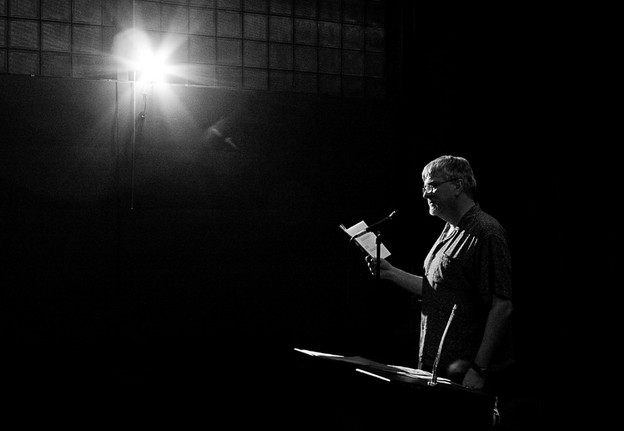Roland Prevost: two new poems

What I’ve always found interesting about Ottawa poet Roland Prevost’s poetry is in the lengthy, detailed process that brought him to where he is now. For an hour or three a day, he composes in what he refers to as his “logbook”: composing journal entries, drafts of fiction, poetry and essays, and notes on recent reading. It has only been over the past decade or so, upon emerging to engage with Ottawa’s community of writers, reading series, publishers and performers, that Prevost has begun to shift in his composition, becoming more deliberate about writing poems-as-poems, all of which has culminated in his first book of poetry, Singular Plurals (Chaudiere Books, 2014). Constructed from years’ worth of materials, the book was launched in October 2014 as part of the Ottawa International Writers Festival, alongside new titles by Amanda Earl and Monty Reid. In an interview recently posted at Touch the Donkey, Prevost describes some of the “logbook” process:
My successful logbook journey began at the age of 15, after half a dozen failed attempts to keep a daily journal. Somehow on this particular try, the habit finally took hold. If I were to guess at what made the difference, I’d say it was a sense of exploration. A huge drive to understand the world, this life, and awareness. Though the logbook contained many rough drafts of works of fiction, short plays, short stories or poems, these for many years took a back seat to working out insights, discoveries, and understandings. The creative writings were a means to an exploratory end. Their texts were probes, existential experiments, and not aesthetically meant for public consumption.
At around age 45, that is after 30 years of this, I felt like I’d gotten a decent preliminary look around. Also, along my travels and explorations, I’d discovered that the concept of human culture had taken on a growing importance for me. For the first time, I felt I could and perhaps should give priority to creative work.
[…]
The main difference between the logbook and a poem is that, whereas they both share my drive to “encapsulate meaningful awareness-tunings,” with poems, I’m trying to do so in an aesthetic medium, and sometimes also, for the purpose of placing the work on River for a potential eventual re-animation by others.
I have rarely seen anyone approach poetry with such careful thought and research, and his poems revel in the fragment, disconnect and the hard return, constantly working to explore the finer details of form even as he accumulates poems-as-fragments together across an increasingly-large canvas. Whether constructed as incredibly dense stand-alone pieces or extended sequences, his poems are highly aware of sound, staccato, disjuncture and precision. And yet, his pieces are often built as short essay-narratives, working through a series of problems through seeking out the right questions as much as any possibility of solution. Prevost’s approach has always been thoughtful, even methodical, as he’s worked to understand and absorb a variety of ideas, techniques and influences, whether as part of the former Ampersand poetry group (with Amanda Earl, Pearl Pirie, Marcus McCann, N.W. Lea, Christine McNair and Sandra Ridley) or jwcurry’s sound poetry ensemble, MESSAGIO GALORE. Throughout, he has constantly asked questions on form, structure and performance, predominantly posed to himself and his own work, but also to Stephen Brockwell, Pearl Pirie, myself and numerous others. In a short interview posted at Open Book: Ontario in December, 2012, he points to the late Alberta poet Robert Kroetsch’s The Ledger (Brick/Nairn/Coldstream, 1975)—a work since collected in Completed Field Notes: The Long Poems of Robert Kroetsch (University of Alberta Press, 2000)—as an important influence. He writes:
This long poem plays so nimbly and originally with both form and meaning that it repeatedly acts as a catalyst.
I’d seen such explorations before, when reading poetry in my youth, in the works of such people as e.e.cummings and bpnichol. But Kroetsch’s particular blend of form and message in “The Ledger” continues to strongly appeal to me. Such a strange and potent magic, there. It’s inspired a finer sense of balance regarding WHAT you can say and HOW you can say it, in writing both poetry and short stories.
So far, his writing has predominantly kept to Ottawa-area publications, working on a continuous series of engagements with his immediate literary community, including appearances in Arc Poetry Magazine, Descant Magazine, The Toronto Quarterly, Dusie, The Ottawa Arts Review, Stone Chisel, The Bywords Quarterly Journal, The Peter F. Yacht Club and ottawater, as well as four poetry chapbooks: Metafizz (Bywords, 2007), Dragon Verses (Dusty Owl, 2009), Our/Are Carried Invisibles (above/ground press, 2009), and Parapagus (above/ground press, 2012). As Pearl Pirie wrote of Singular Plurals, a work constructed from much of the materials from his four published chapbooks, as part of her “95 books” project:
There are little sonic beauties of sound and sense thru like “silk of raindrops/sound umbrellas” where the expected noun verbs and makes it remind how the echo bounces and tells us the shape of the whole environment in the rain. Language also takes time to play such as in one of my favourites “His Coloured Concrete Pieces” “Black&White tv comedies/demi-century artefacts/pretending to sleep. Possum ously.”
Theory Makes Chaos Work
Where nothing’s a better future
blinkDig in – start evader tactics
Cry me a principle
of order & disorder
with your trite rosettaUnpredictable cats in lab coats
will still stir our quantum soups
& churn all our marbles
Itch Philosophy
At what’s unknown
each living cell
each hair
stands in wild applauseThis fills the empty map
When a crooked halo
dangles off your headcompel a tickle
Ask if angels exist
Some notes on Canadian poetry